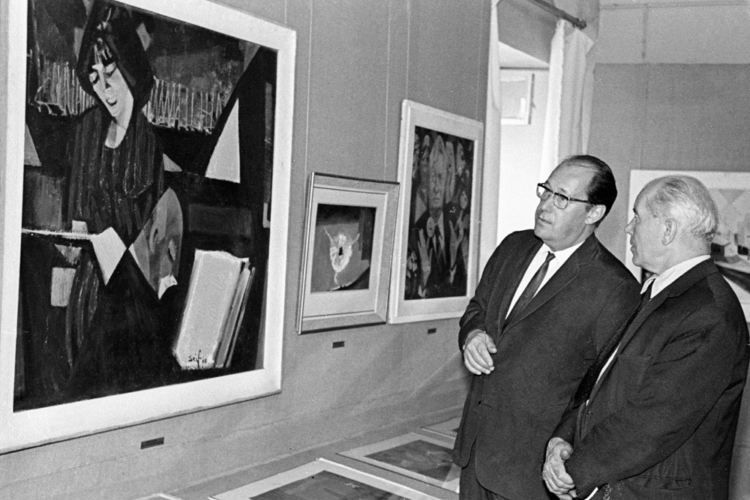The Hero Didn't Get His Face Right Away: The Story of the Creation of a Collective Image of a Soviet Soldier
Published: by .

The poet gave his hero a seemingly ordinary surname, but a "speaking" one, with the meaning: supposedly, this man is, as they say, seasoned, but cheerful, and therefore capable of finding a way out of the most difficult situation. Tvardovsky received many readers' responses to the poem. And it turned out that Tyorkin had front-line soldiers with the same surname, some of the letters were from them.
Terkin first appeared on the pages of the newspaper "On Guard of the Motherland" during the Finnish campaign (1939-1940). This image was born in the joint work of war correspondents, including famous poets – Alexander Tvardovsky, Nikolai Tikhonov and Tsezar Solodar. They created small poetic feuilletons for each issue, in which Vasya Terkin, a seasoned Russian guy, appeared. These publications were included in the brochure "Vasya Terkin at the Front" (1940). It was often given to soldiers as a kind of award.
The successfully found image continued to live in the poem "Vasily Terkin. A Book about a Soldier". It began to be published in a newspaper version in 1942 and was completed in 1945. And the following year it was awarded the Stalin Prize. The remarkable Russian prose writer and poet, Nobel laureate Ivan Bunin assessed the poem as follows: "This is a truly rare book: what freedom, what wonderful daring, what accuracy, precision in everything and what an extraordinary folk soldier's language – not a single knot, not a hitch, not a single false, ready-made, that is, literary-vulgar word!"

Artist Orest Vereisky (left) Photo: Yuri Ivanov / RIA Novosti
Tvardovsky asked the artist Orest Vereisky to illustrate "The Book of a Soldier" (1943). The poet wanted to open the book with a portrait of its main character, Vasily Terkin. And this turned out to be the most difficult. What was he, Terkin, like? Many of the soldiers whose portraits the artist sketched from life seemed to him to be somewhat similar to Terkin – some with a smile, some with a squint of cheerful eyes, some with a freckled face. Of course, the artist showed the sketches to Tvardovsky. And each time he heard in response: "No, it's not him."
And then one day, a correspondent for the army newspaper, Vasily Glotov, showed up. He had accompanied Tvardovsky on trips to the front more than once. Sometimes they spent the night together in dugouts, covered with one overcoat.

Illustration for the poem "Vasily Terkin" by Alexander Tvardovsky, author – Orest Vereisky Photo: Abram Shterenberg / RIA Novosti
"A few days passed," Vereisky recalled, "and suddenly, with a joyful feeling that pierced me, I recognized Vasily Tyorkin in Vasily Glotov. I rushed to Alexander Trifonovich with my discovery. At first, he raised his eyebrows in surprise, then asked me to draw Glotov first. The idea of "trying out" the image of Tyorkin seemed funny to Glotov. When I drew him, he squinted slyly, broke into a smile, which made him even more like Tyorkin, as I imagined him… I showed the sketches to Tvardovsky. And he said: "Yes!" And from then on, I never allowed the slightest attempt to depict Tyorkin as someone else."

A silver three-ruble coin with the image of Vasily Terkin, made according to a drawing by the artist Orest Vereisky, was put into circulation in connection with the 55th anniversary of the Victory.
On the gifted copy of "The Book about a Fighter" the poet wrote: "To Vasily Ivanovich Glotov, a close relative of Vasily Terkin, my dear comrade in war. A. Tvardovsky. 1945."
But Glotov not only served as a model for the canonical image of Vasily Tyorkin. The front-line soldier had his own established fate. After the war, he graduated from the Literary Institute and established himself as a poet, essayist, prose writer and translator, and was accepted into the Union of Writers of the USSR. His books still find their readers.

Soviet poet, prose writer and translator Vasily Ivanovich Glotov, 1985 Photo: Vladimir Peslyak / TASS Photo Chronicle
By the way, the 19th century writer P. D. Boborykin, now almost forgotten, has a novel "Vasily Terkin" (1892) about a merchant who personified the worst features of this class. Some literary experts reproached A. Tvardovsky for the fact that the title of his poem coincided with the title of the novel, and tried to give this accidental coincidence a political coloring. Fortunately, these reproaches had no consequences.
Comments